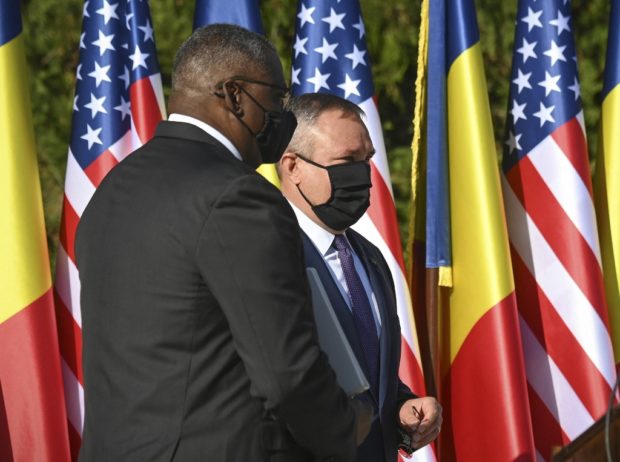US in uphill battle to challenge Russia in Black Sea

US Defense Secretary Lloyd Austin (L) and Romanian Defense Minister Nicolae Ciuca arrive to address a press conference at the Romanian Defense Ministry’s headquarters in Bucharest, Romania, on October 20, 2021. Austin visits Romania before attending the meeting of NATO Defense Ministers that will take place from October 21-22, 2021 in Brussels. (Photo by Daniel MIHAILESCU / AFP)
BUCHAREST, Romania — On the day that two Russian fighter jets suddenly scrambled to intercept a US bomber refueling mid-air near Crimea, US Defense Secretary Lloyd Austin was visiting three Black Sea states.
The high-profile trip for the normally low-key Pentagon chief demonstrated that aside from facing down Chinese military expansion in the Indo-Pacific, the administration of US President Joe Biden sees the Black Sea as a key front in challenging Russia.
And the scrambling of the Russian Sukhoi jets on Tuesday shows how the region is perhaps the riskiest flashpoint on NATO’s eastern flank and how steep the challenge is for the Pentagon in contesting Moscow’s dominance of the Black Sea.
Austin this week visited Georgia, Romania and Ukraine, seeking to shore up Western allies from the former Soviet bloc. In Tbilisi, he and the Georgian government initialed a plan for a new six-year military training program.
“The United States condemns Russia’s ongoing occupation of Georgia and its attempts to expand influence in the Black Sea region through military coercion and malign activities,” Austin told Georgian Prime Minister Irakli Garibashvili on Monday.
Russian troops currently occupy two breakaway regions in the country.
A day later in Kiev, Austin denounced Russia’s 2014 seizure of Crimea — which vastly expanded Moscow’s own maritime access — and its “destabilizing activities in the Black Sea.”
Confrontations in the Black Sea have been increasing for several years.
In November 2018 Russia fired on and then seized three Ukrainian naval vessels operating near Crimea, returning them and their crew nearly a year later.
‘Vulnerable’
In June this year Russia patrol boats and fighter jets harassed and threatened a British warship as it sailed off the coast of Crimea.
A few days later a Dutch navy frigate, like the British in the region for exercises, experienced similar menacing acts over a five-hour period in the northern Black Sea.
Yet so far, the efforts to contain Russia have had little impact.
Austin’s visit aimed to rev up those efforts, focused on building stronger security cooperation between the states on the Black Sea rim.
It means more military training for Georgia; arms and patrol ships for Ukraine; and, for NATO member Romania, home to nearly 1,000 US troops and a potent American Aegis missile defense unit, strengthening it as a node for Black Sea region coordination and intelligence.
“The security and stability of the Black Sea are in the US’s national interest and critical for the security of NATO’s eastern flank,” Austin said Wednesday in Romania.
“The region is vulnerable to Russian aggression.”
There was no comment from Moscow on Austin’s efforts, but for the in-air challenge to the US bombers Tuesday from the Russian jets.
US experts concede that so far Russia remains impervious.
‘As important as anywhere else’
In 2018 a Rand think-tank study, based on a strategic gaming exercise involving theoretical confrontations, concluded that Russia at the time had the upper hand, especially since it took control of Crimea.
“A Russian goal of preventing regional cooperation may be easier to achieve than the task of building regional consensus,” it summed up.
But its recommendations were exactly what Washington is trying to do: strengthen the military capabilities of Bulgaria, Georgia, Romania, Turkey and Ukraine, and to get them to work together.
“Russia may strategically apply tailored pressure and incentives to the other five littoral states that would likely further undermine unity around multilateral action,” the study warned.
The US goal is not easy, a Pentagon official admitted. For example, despite both being NATO members, Bulgaria does not get along with Turkey, and both are militarily and economically vulnerable to pressure from Russia.
And Turkey, which dominates the southern Black Sea, is skeptical of having more US and NATO ships patrolling the area to prevent Russia from dominating the region.
“We try to encourage a focus on just what we have in common… and let other issues not be part of that,” the Pentagon official said, citing a recent pact between Romania and Bulgaria to open their air space to overflights from the other.
“That’s part of what we are trying to do, to make sure… that everybody is contributing to Black Sea security in their own way,” the official said.
“Black Sea allies have sometimes worried that there is not as much focus there as on the Baltic region. Part of what we are often saying … is that the Black Sea is as important as anywhere else,” the official said.














